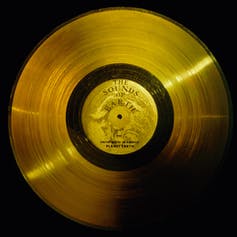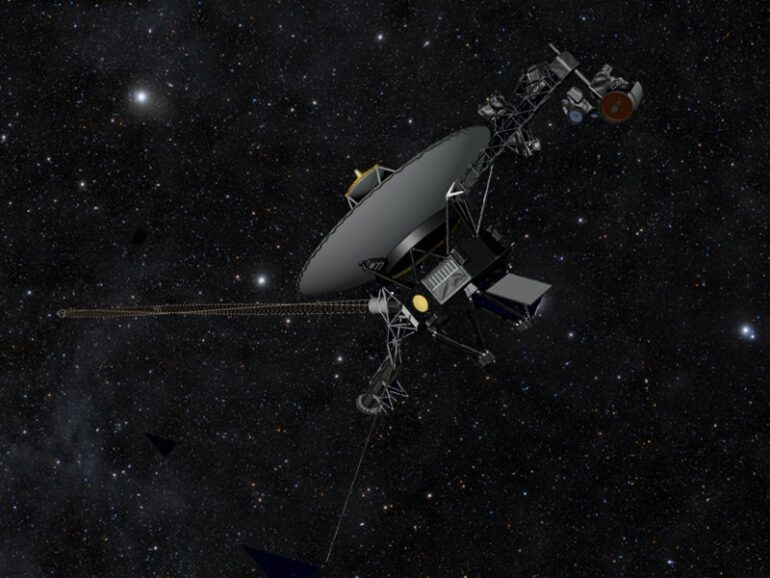Voyager 1 is the farthest human-made object from Earth. After sweeping by Jupiter, Saturn, Uranus and Neptune, it is now almost 15 billion miles (24 billion kilometers) from Earth in interstellar space. Both Voyager 1 and its twin, Voyager 2, carry little pieces of humanity in the form of their Golden Records. These messages in a bottle include spoken greetings in 55 languages, sounds and images from nature, an album of recordings and images from numerous cultures, and a written message of welcome from Jimmy Carter, who was U.S. president when the spacecraft left Earth in 1977.

Each Voyager spacecraft carries a Golden Record containing two hours of sounds, music and greetings from around the world. Carl Sagan and other scientists assumed that any civilization advanced enough to detect and capture the record in space could figure out how to play it.
NASA/Wikimedia Commons
The Golden Records were built to last a billion years in the environment of space, but in a recent analysis of the paths and perils these explorers may face, astronomers calculated that they could exist for trillions of years without coming remotely close to any stars.
Having spent my career in the field of religion and science, I’ve thought a lot about how spiritual ideas intersect with technological achievements. The incredible longevity of the Voyager spacecraft presents a uniquely tangible entry point into exploring ideas of immortality.
For many people, immortality is the everlasting existence of a soul or spirit that follows death. It can also mean the continuation of one’s legacy in memory and records. With its Golden Record, each Voyager provides such a legacy, but only if it is discovered and appreciated by an alien civilization in the distant future.

Many religions espouse some form of life after death.
RubberBall Productions/Brand X Pictures via Getty Images
Life after death
Religious beliefs about immortality are numerous and diverse. Most religions foresee a postmortem career for a personal soul or spirit, and these range from everlasting residence among the stars to reincarnation.
The ideal eternal life for many Christians and Muslims is to abide forever in God’s presence in heaven or paradise. Judaism’s teachings about what happens after death are less clear. In the Hebrew Bible, the dead are mere “shades” in a darkened place called Sheol. Some rabbinical authorities give credence to the resurrection of the righteous and even to the eternal status of souls.
Immortality is not limited to the individual. It can be collective as well. For many Jews, the final destiny of the nation of Israel or its people is of paramount importance. Many Christians anticipate a future general resurrection of all who have died and the coming of the kingdom of God for the faithful.
Jimmy Carter, whose message and autograph are immortalized in the Golden Records, is a progressive…
